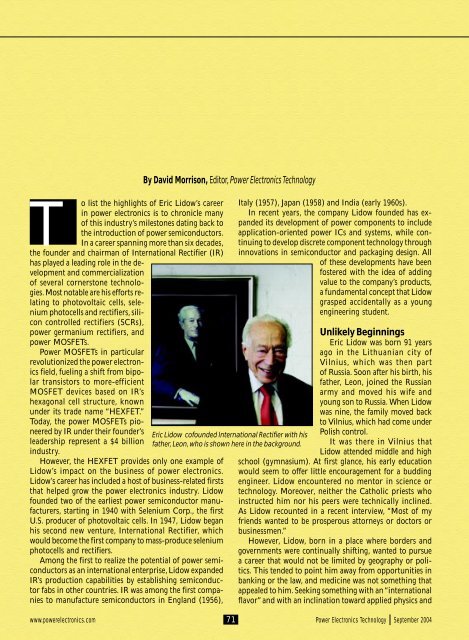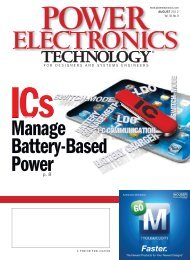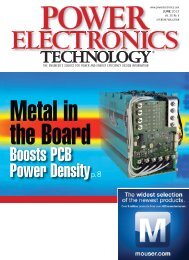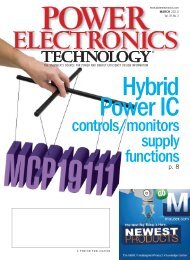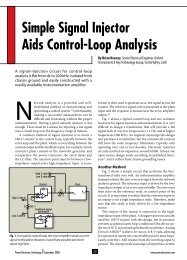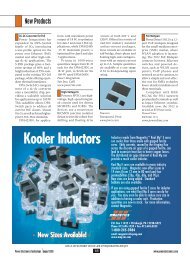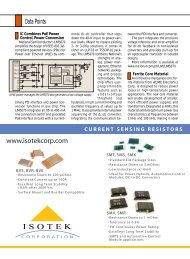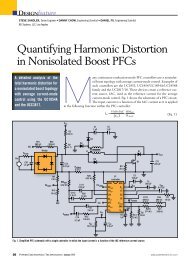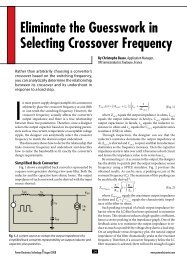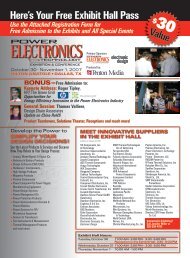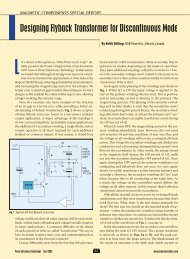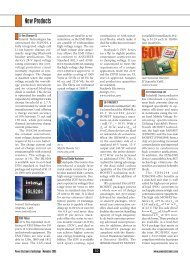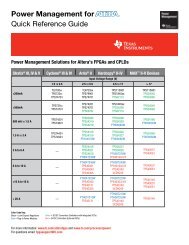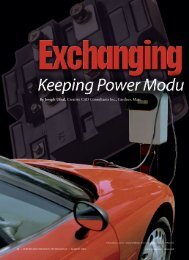Power Electronics Technology September 2004 www ...
Power Electronics Technology September 2004 www ...
Power Electronics Technology September 2004 www ...
Create successful ePaper yourself
Turn your PDF publications into a flip-book with our unique Google optimized e-Paper software.
T<br />
o list the highlights of Eric Lidow’s career<br />
in power electronics is to chronicle many<br />
of this industry’s milestones dating back to<br />
the introduction of power semiconductors.<br />
In a career spanning more than six decades,<br />
the founder and chairman of International Rectifier (IR)<br />
has played a leading role in the development<br />
and commercialization<br />
of several cornerstone technologies.<br />
Most notable are his efforts relating<br />
to photovoltaic cells, selenium<br />
photocells and rectifiers, silicon<br />
controlled rectifiers (SCRs),<br />
power germanium rectifiers, and<br />
power MOSFETs.<br />
<strong>Power</strong> MOSFETs in particular<br />
revolutionized the power electronics<br />
field, fueling a shift from bipolar<br />
transistors to more-efficient<br />
MOSFET devices based on IR’s<br />
hexagonal cell structure, known<br />
under its trade name “HEXFET.”<br />
Today, the power MOSFETs pio-<br />
neered by IR under their founder’s<br />
leadership represent a $4 billion<br />
industry.<br />
However, the HEXFET provides only one example of<br />
Lidow’s impact on the business of power electronics.<br />
Lidow’s career has included a host of business-related firsts<br />
that helped grow the power electronics industry. Lidow<br />
founded two of the earliest power semiconductor manufacturers,<br />
starting in 1940 with Selenium Corp., the first<br />
U.S. producer of photovoltaic cells. In 1947, Lidow began<br />
his second new venture, International Rectifier, which<br />
would become the first company to mass-produce selenium<br />
photocells and rectifiers.<br />
Among the first to realize the potential of power semiconductors<br />
as an international enterprise, Lidow expanded<br />
IR’s production capabilities by establishing semiconductor<br />
fabs in other countries. IR was among the first companies<br />
to manufacture semiconductors in England (1956),<br />
By David Morrison, Editor, <strong>Power</strong> <strong>Electronics</strong> <strong>Technology</strong><br />
Eric Lidow cofounded International Rectifier with his<br />
father, Leon, who is shown here in the background.<br />
Italy (1957), Japan (1958) and India (early 1960s).<br />
In recent years, the company Lidow founded has expanded<br />
its development of power components to include<br />
application-oriented power ICs and systems, while continuing<br />
to develop discrete component technology through<br />
innovations in semiconductor and packaging design. All<br />
of these developments have been<br />
fostered with the idea of adding<br />
value to the company’s products,<br />
a fundamental concept that Lidow<br />
grasped accidentally as a young<br />
engineering student.<br />
Unlikely Beginnings<br />
Eric Lidow was born 91 years<br />
ago in the Lithuanian city of<br />
Vilnius, which was then part<br />
of Russia. Soon after his birth, his<br />
father, Leon, joined the Russian<br />
army and moved his wife and<br />
young son to Russia. When Lidow<br />
was nine, the family moved back<br />
to Vilnius, which had come under<br />
Polish control.<br />
It was there in Vilnius that<br />
Lidow attended middle and high<br />
school (gymnasium). At first glance, his early education<br />
would seem to offer little encouragement for a budding<br />
engineer. Lidow encountered no mentor in science or<br />
technology. Moreover, neither the Catholic priests who<br />
instructed him nor his peers were technically inclined.<br />
As Lidow recounted in a recent interview, “Most of my<br />
friends wanted to be prosperous attorneys or doctors or<br />
businessmen.”<br />
However, Lidow, born in a place where borders and<br />
governments were continually shifting, wanted to pursue<br />
a career that would not be limited by geography or politics.<br />
This tended to point him away from opportunities in<br />
banking or the law, and medicine was not something that<br />
appealed to him. Seeking something with an “international<br />
flavor” and with an inclination toward applied physics and<br />
<strong>www</strong>.powerelectronics.com 71<br />
<strong>Power</strong> <strong>Electronics</strong> <strong>Technology</strong> <strong>September</strong> <strong>2004</strong>


